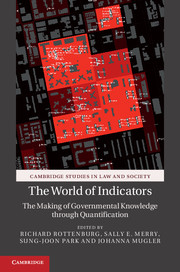Book contents
- Frontmatter
- Contents
- List of figures
- List of tables
- List of abbreviations
- List of contributors
- 1 A world of indicators: The making of governmental knowledge through quantification
- 2 The flight of the indicator
- 3 Narrating numbers
- 4 By their own account: (Quantitative) Accountability, Numerical Reflexivity and the National Prosecuting Authority in South Africa
- 5 Failure by the numbers? Settlement statistics as indicators of state performance in South African land restitution
- 6 Doing the transparent state: Open government data as performance indicators
- 7 Charting the road to eradication: Health facility data and malaria indicator generation in rural Tanzania
- 8 ‘Nobody is going to die’: An ethnography of hope, indicators and improvizations in HIV treatment programmes in Uganda
- 9 Financial indicators and the global financial crash
- 10 New global visions of microfinance: The construction of markets from indicators
- 11 Spirits of neoliberalism: ‘Competitiveness’ and ‘wellbeing’ indicators as rival orders of worth
- 12 Climate change vulnerability indicators: from noise to signal
- 13 Retroaction: how indicators feed back onto quantified actors
- Index
- Cambridge Studies in Law and Society
- References
11 - Spirits of neoliberalism: ‘Competitiveness’ and ‘wellbeing’ indicators as rival orders of worth
Published online by Cambridge University Press: 05 October 2015
- Frontmatter
- Contents
- List of figures
- List of tables
- List of abbreviations
- List of contributors
- 1 A world of indicators: The making of governmental knowledge through quantification
- 2 The flight of the indicator
- 3 Narrating numbers
- 4 By their own account: (Quantitative) Accountability, Numerical Reflexivity and the National Prosecuting Authority in South Africa
- 5 Failure by the numbers? Settlement statistics as indicators of state performance in South African land restitution
- 6 Doing the transparent state: Open government data as performance indicators
- 7 Charting the road to eradication: Health facility data and malaria indicator generation in rural Tanzania
- 8 ‘Nobody is going to die’: An ethnography of hope, indicators and improvizations in HIV treatment programmes in Uganda
- 9 Financial indicators and the global financial crash
- 10 New global visions of microfinance: The construction of markets from indicators
- 11 Spirits of neoliberalism: ‘Competitiveness’ and ‘wellbeing’ indicators as rival orders of worth
- 12 Climate change vulnerability indicators: from noise to signal
- 13 Retroaction: how indicators feed back onto quantified actors
- Index
- Cambridge Studies in Law and Society
- References
Summary
Market prices are indicators of value or worth. A market is a system of indication, in which quantities of money are viewed as commensurate to the value of goods and services being traded. But is this a good system of indication? Why would we select price as our preferred indicator, and not some other indicator? These questions lead towards a ‘meta’ question, of what is valuable about the price system, and how might that be indicated.
An orthodox liberal economic argument is that markets increase efficiency, because both parties in an exchange are better off than they were prior to the exchange, assuming that it was conducted voluntarily. The premise of nineteenth century liberalism was that such exchanges will arise organically and ‘naturally’, once the state retreats from the economic domain, creating an autonomous space of free trade (Polanyi 1957). But prior to the rise of market society, broader moral arguments had to be mobilized in favour of the price system, which went beyond narrow claims about efficiency (Hirschman 1977). And by the late nineteenth century, with the rise of large corporations, institutionalist ideas and organized socialism, the case for the market was being lost once more. Neoliberalism, as first propagated in the 1930s by Friedrich Hayek, Henry Simons and the ordo-liberals, would necessarily involve restating and reinventing the argument in favour of the market, as a basis for social coordination and valuation (Mirowski and Plehwe 2009).
As Foucault stresses in his lectures on neoliberalism, its proponents never advocated a straightforward reversal of the trends towards bureaucratic, regulated, hierarchical capitalism that had swept Europe and the United States from 1870 onwards (Foucault 2008). Nor did they seek necessarily to shrink the state or the ‘social’ realm, in the hope that an autonomous free market would emerge once more. Instead, they sought to reinvent society and state in ways that were commensurate with the ethos and logic of the market. What distinguishes neoliberalism is its acutely idealist and constructivist effort to govern, measure and evaluate all domains of society according to principles extracted from the market (Mirowski 2009). Specific behaviours, ideals, characteristics and norms are identified with the free market (most commonly, those associated with ‘enterprising’ activity), and then employed as a basis on which to criticize and test institutions (Davies 2014).
- Type
- Chapter
- Information
- The World of IndicatorsThe Making of Governmental Knowledge through Quantification, pp. 283 - 306Publisher: Cambridge University PressPrint publication year: 2015
References
- 13
- Cited by



